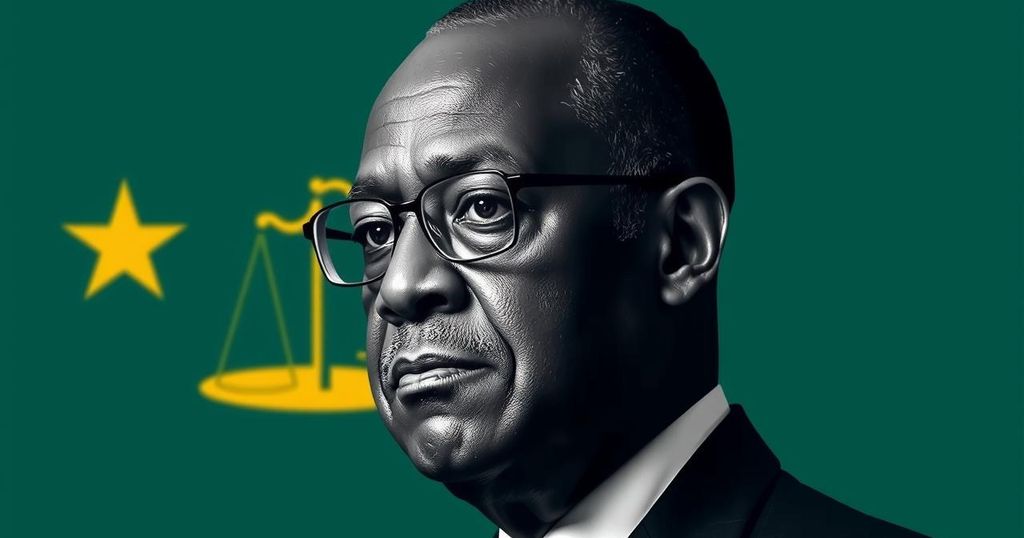The Democratic Republic of the Congo is contemplating a constitutional review, which could enable President Félix Tshisekedi to extend his tenure. While Tshisekedi emphasizes the need for a new constitution aligned with Congolese nationalism, opposition leaders fear that the revision aims to consolidate power. The opposition remains vehemently against any changes, reiterating their commitment to safeguarding democratic principles, with significant voices, including the Catholic Church, warning against potential instability from constitutional alterations.
The Democratic Republic of the Congo (DRC) is currently contemplating a constitutional review, which many perceive as a potential means for President Félix Tshisekedi to extend his term in office. Augustin Kabuya, a prominent official within Tshisekedi’s administration, underscored that the existing constitution has displayed limitations regarding public governance. Meanwhile, President Tshisekedi has articulated the need for a more “worthy” constitution that aligns more closely with Congolese nationalism. During a recent visit to Kisangani, he announced plans to establish a committee dedicated to drafting a new constitution attuned to the realities of Congolese society. The current constitution, enacted in 2006 following a referendum aimed at establishing a stable electoral democracy after years of conflict, is now under scrutiny. The opposition, which historically opposed previous constitutional reforms proposed by former President Joseph Kabila, is adamantly resisting any amendment attempts now made by Tshisekedi’s administration. Critics assert that the president and his party are seeking to manipulate constitutional provisions to secure prolonged power. Despite Tshisekedi’s assurance that any alterations would be contingent upon the will of the people, his allies have suggested interpretations that imply the president’s tenure may be extended beyond the constitutional limit of two terms. Opposition leaders, including Moïse Katumbi and Martin Fayulu, have expressed unequivocal opposition to any constitutional changes. Katumbi vocally asserted, “This law will not be changed,” while Fayulu pledged to mobilize the public against any indefinite extensions of presidential tenure. Furthermore, the Catholic Church has cautioned against potential instability that could arise from such changes, emphasizing the need for political leaders to prioritize national interests over personal ambitions. Ultimately, the discussion surrounding the constitutional review reflects deeper concerns regarding governance and democratic integrity within the DRC.
The current discussions surrounding the constitutional review in the Democratic Republic of the Congo (DRC) are rooted in a complex history of political instability and power struggles. The existing constitution was adopted in 2006 in an effort to consolidate democracy following a protracted period of conflict and authoritarian rule under President Joseph Kabila. Since its inception, any attempt to reform the constitution has been met with fierce opposition, particularly from members of the political opposition who view such reforms as maneuvers by those in power to consolidate authority. President Félix Tshisekedi and his administration’s recent actions to propose a constitutional review have sparked fears among the opposition that these changes could be aimed at extending his presidency beyond the term limits established within the current constitution. With alarming implications for democratic governance, the opposition fears that any adjustments made could undermine electoral integrity and consolidate power within the ruling party.
In summary, the potential revision of the constitution in the Democratic Republic of the Congo raises critical questions regarding political intentions and the future of democratic governance in the country. President Tshisekedi’s call for a new constitution is met with apprehension from opposition leaders and civil society, who fear that such changes could facilitate an indefinite extension of his rule. The opposition remains united in its commitment to resist any amendments that might threaten the established limits on presidential terms, while prominent institutions, including the Catholic Church, warn of the risks of destabilizing an already fragile political landscape. The forthcoming decisions on this matter will significantly shape the DRC’s democratic trajectory.
Original Source: www.monitor.co.ug






